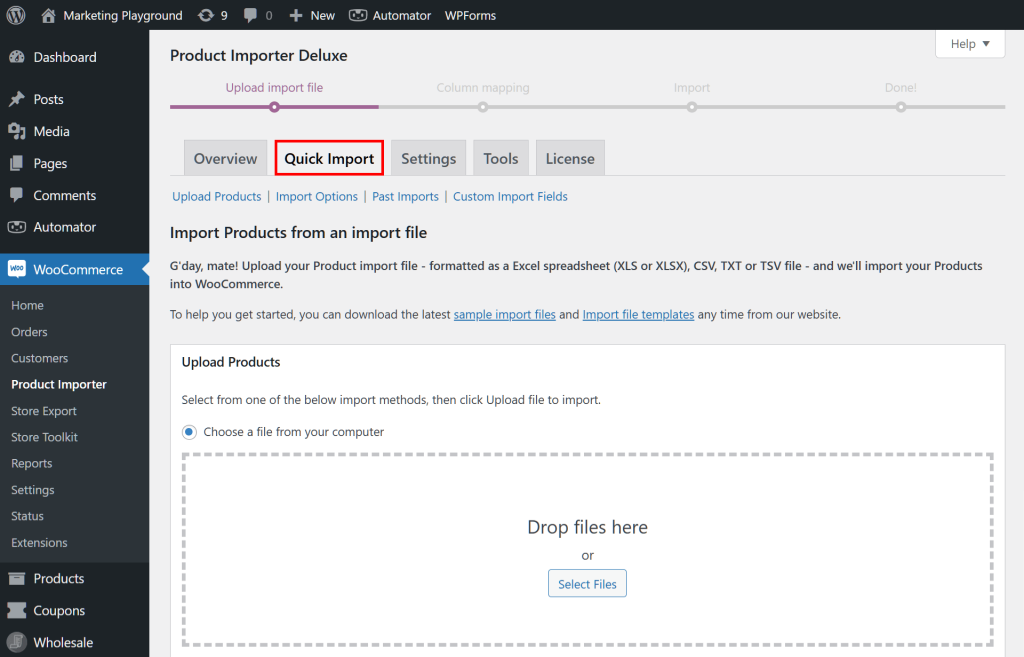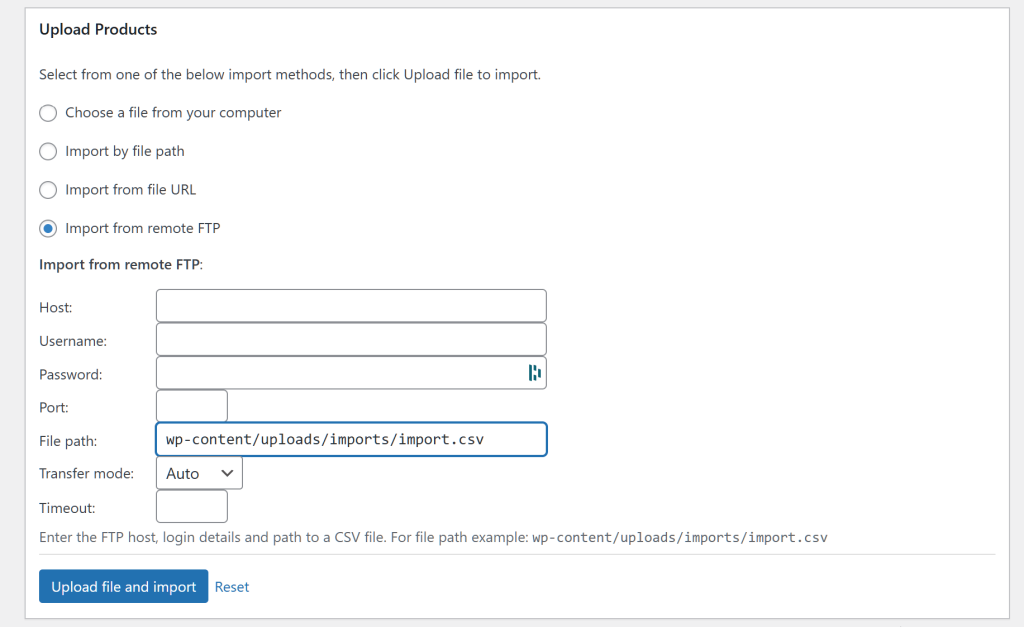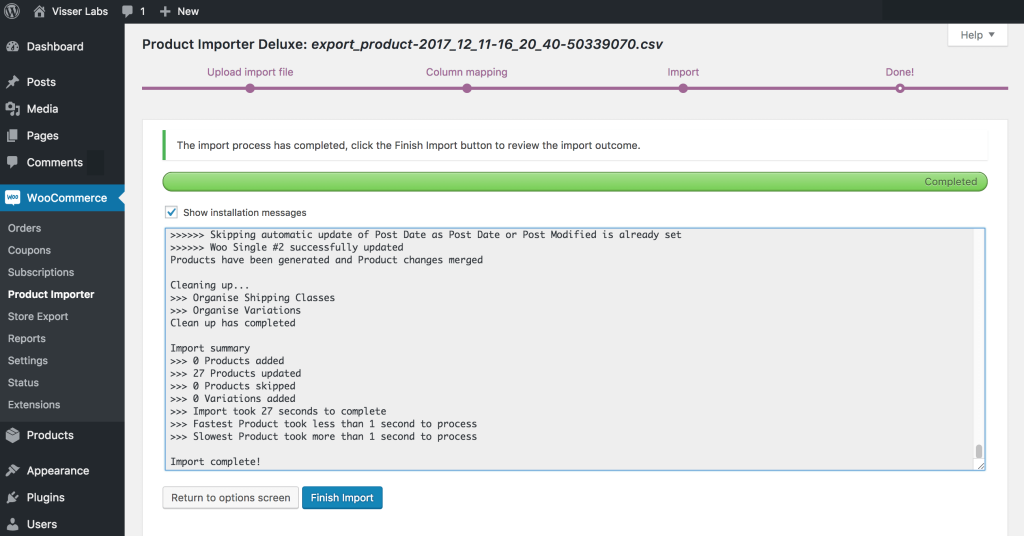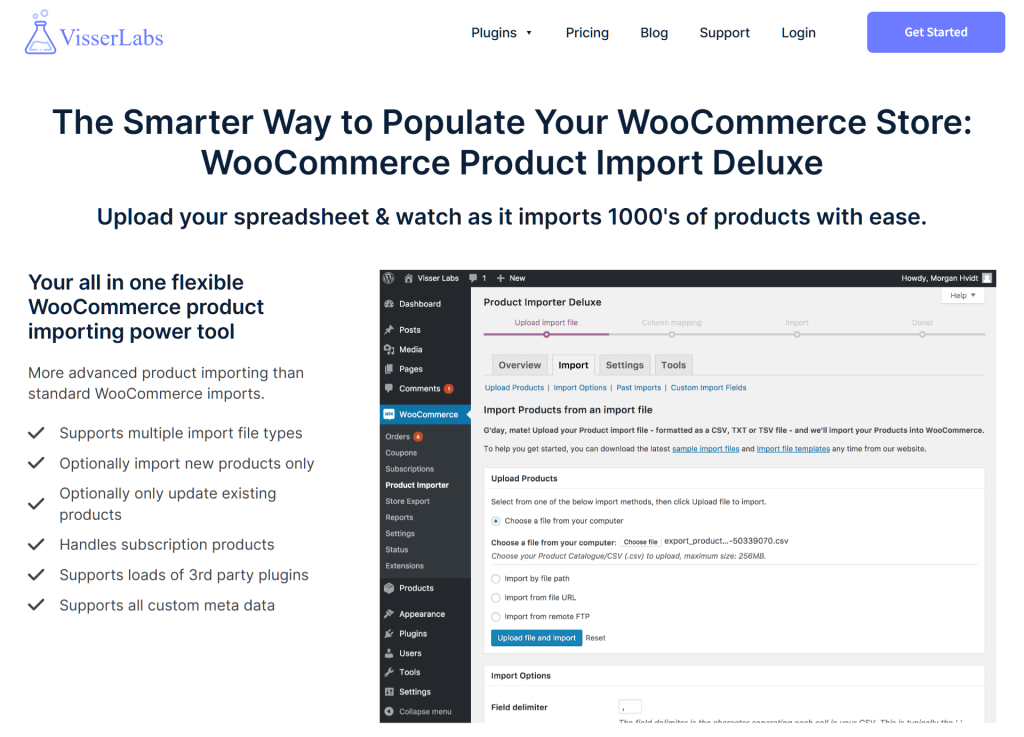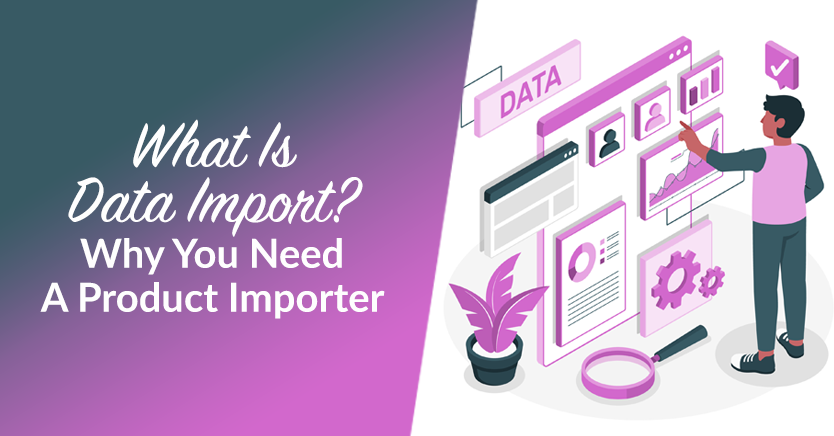
Operating an online store involves managing mountains of product data. To help streamline this task, you need to master the import of product data. But what is data import, exactly? And why is it crucial for the success of your e-commerce endeavor?
In simple terms, data import entails the transfer of data from one source to another destination. This process ensures that data is accurately and efficiently moved.
Today, we’ll answer “What is data import?” and other key questions. We’ll do so by exploring data import and its importance to product management and the presentation of products to shoppers. By understanding the process and leveraging versatile tools like WooCommerce Product Importer Deluxe, you can simplify your online store operations and improve the customer experience.
So let’s get right into it!
I. What Is Data Import?
Importing data is the process of transferring data from one source, typically a specific file format, to another destination, often a database or software platform.
Essentially, the main goal of importing data is to integrate the data into the new system without compromising the data’s integrity or functionality. To ensure data is accurately and efficiently moved and transformed, the import process typically involves several steps. These can include converting the data into a compatible format, validating the data to ensure accuracy, and mapping the data fields from the source to the destination.
The data import sequence
To gain a complete answer to the “What is data import?” question, it helps to know all the steps in the process.
With that in mind, here are the steps in more detail:
- Data backup: Create backups of the original data to prevent data loss.
- Data extraction: Extract data from the source file or database.
- Transformation of data: Convert data into a compatible format for the destination system.
- Validation of data: Check for errors, inconsistencies, and missing values to ensure data accuracy.
- Data mapping: Align data fields from the source to corresponding fields in the destination system.
- Data loading: Transfer the data into the new system.
- Error handling: Identify and correct any errors that occurred during the import process.
- Data verification: Confirm that the data has been accurately imported and that all records are complete.
- System integration: Ensure the imported data integrates seamlessly with existing data and applications in the new system.
- Testing and quality assurance: Conduct tests to verify that the data performs as expected in the new environment.
That’s a lot of steps! Thankfully, a powerful data importer tool automates the entire process quickly and accurately (more on data importer tools below).
This sequence ensures that the data is properly prepared and validated before being imported, with backups in place to safeguard against any issues. The sequence order can vary slightly depending on the specific requirements and context of the data import process.
II. What Is Product Data Import?
In the context of e-commerce stores, importing product data refers to the process of transferring detailed information about products from one system or file format to another, typically into an e-commerce platform or online store database. This ensures that all relevant product information is accurately integrated into the store’s catalog. In turn, this facilitates easy management and presentation of products to customers.
Of course, the main goal is also to ensure that product data is easily incorporated without losing any details or causing errors.
Furthermore, the process of importing product data uses the same steps as detailed above.
III. Why Import Product Data?
If you’re already running an online store, then perhaps a more important question than “What is data import?” is “Why import product data?”
Importing product data is important for online stores for several major reasons:
1. Efficiency
Manually entering product details into an online store can be time-consuming and prone to errors. Thankfully, using a data importer tool to import data allows for the quick and accurate transfer of large amounts of product information. This saves time and reduces the risk of mistakes.
2. Accuracy
Importing ensures that product information is consistently and correctly entered into the store’s database. This includes details like product names, descriptions, prices, images, and SKU numbers. For one thing, accurate data helps maintain the store’s integrity. For another, it enhances the shopping experience for customers.
3. Consistency
When you import product data, all information is standardized. Basically, this means products will be listed uniformly across the site. Thus, it becomes easier for customers to navigate your online store and find what they’re looking for.
4. Scalability
As your online store grows, the number of products can increase significantly. Fortunately, importing product data makes it easier to manage and update large inventories. As a result, you allow your store to scale efficiently without being bogged down by manual data entry.
5. Integration
Importing product data guarantees that new product information integrates seamlessly with existing systems and databases. Consequently, data will work well with other tools and applications your store uses, such as inventory management systems, marketing tools, and sales platforms.
6. Error reduction
The import process includes validation and error-handling steps, which identify and fix issues with the data before it goes live on the store. This reduces the likelihood of customers encountering problems such as incorrect prices or missing product information.
7. Backup and safety
Before importing, data backups are created to prevent loss of information. This ensures that if anything goes wrong during the import process, the original data is still safe and can be restored.
Overall, importing product data makes running an online store more efficient, accurate, and scalable. Moreover, it improves the customer experience by ensuring reliable and consistent product information.
IV. How To Import Product Data: The Power Of Product Importer Tools
To import product data efficiently and accurately, you need a product importer tool such as WooCommerce Product Importer Deluxe.
A product importer tool is a software application or system functionality that smoothly moves and transforms large amounts of product data from a file format to a platform. For instance, you can transfer product information (such as product names, prices, etc.) from an Excel spreadsheet to your online store.
To be more specific, product importer tools specialize in receiving, interpreting, and integrating mass data from various file formats into a system. They smoothly bring external data into said system, ensuring compatibility and data consistency.
In addition to importing product details, it’s also possible to streamline how your categories are structured. If you manage a large catalog, learning how to efficiently handle WooCommerce Import Categories can help maintain organization and save time when updating or migrating your store.
Typically, product importer tools can extract mass data from the following file formats:
- XLS or XLSX (Excel spreadsheet)
- CSV (Comma Separated Values)
- TSV (Tab Separated Values)
- TXT (Plain Text File)
V. Why Are Product Importer Tools Important?
Importing data into your WooCommerce store from a file format presents many advantages:
1. Data integration
Importing gives you a convenient and reliable way to integrate external data into your store. Specifically, it allows you to merge, update, or add new information from these formats into your system.
2. Efficient updates
Importing is a powerful tool for updating existing data en masse. You can swiftly modify product details, prices, or quantities, ensuring your store remains up-to-date.
3. Ease of migration
When transitioning from another platform or system, importing data from standard formats streamlines the process. This ensures a smooth shift as well as prevents data loss or disruption.
4. Quick data entry
Importing data means entering information in bulk, allowing you to save precious time. In addition, you prevent the errors that can occur when you manually enter information into a system.
5. Collaboration
Importing data simplifies collaboration and fosters efficient teamwork. After all, it allows team members or partners to provide information in a format that seamlessly integrates into your store.
6. Backup restoration
In case of data loss or system issues, having data in interchange formats allows you to easily restore crucial store details. This guarantees that your critical information is recoverable.
7. Adaptability
Importing data makes adapting to changing needs more convenient. This is because it’s easy to make quick adjustments or additions to data interchange/serialization formats as well as to import updated data into your system.
To summarize, using an importer tool to bring data into your WooCommerce store from interchange/serialization formats facilitates and speeds up data management. Specifically, it offers efficiency, adaptability, and a streamlined approach to integrating, updating, and managing your store’s information.
VI. WooCommerce Product Importer Deluxe
What is data import to a plugin like WooCommerce Product Importer?
WooCommerce Product Importer Deluxe Plugin is Visser Labs’ product importer tool. Basically, it allows you to transfer substantial amounts of product data from various file types into a platform of your choosing. In addition, it can transfer all WooCommerce product fields and even extended fields from 3rd party plugins. Furthermore, this plugin streamlines the entire process, ensuring seamless and accurate transitions.
Here’s a sampling of the features to expect from Visser Labs’ WooCommerce product import plugin:
- Grants you the option to import new products only
- Grants you the option to update existing products only
- Handles subscription products
- Lets you import product data from a PC, file path, URL, or remote FTP
- Lets you import various product types, including simple and subscription products
- Allows the import of a wide range of product data fields
- Supports all custom metadata
- Compatible with WC Vendors and Wholesale Suite
- Compatible with hundreds of other WordPress and WooCommerce plugins
Would you like to learn how to use WooCommerce Product Importer Deluxe? Then check out our comprehensive guide, “WooCommerce Product Import Plugin: The Ultimate Importer Tool Guide.”
Conclusion
Knowing the answer to the question “What is data import?” and understanding how the process applies to product data is essential for running a successful online store. Importing product data ensures efficiency, accuracy, and consistency, making it easier to manage and update large inventories as your store grows.
To recap, to master the process of importing product data, you must familiarize yourself with the following concepts:
- What is data import?
- What is product data import?
- Why import product data?
- How to import product data using product importer tools
Furthermore, it’s important to note that using WooCommerce Product Importer Deluxe simplifies the product data import process, allowing for seamless data integration and quick updates. Leveraging this plugin lets you keep your online store up-to-date. Furthermore, it ensures the reliability of the product information available on said store. Ultimately, this improves the shopping experience for customers and supports the store’s scalability and adaptability.
Do you have any questions in addition to “What is data import?” Let us know in the comments!
